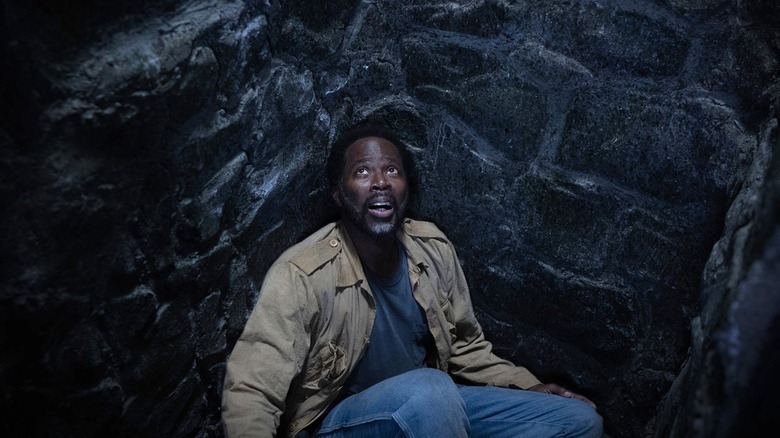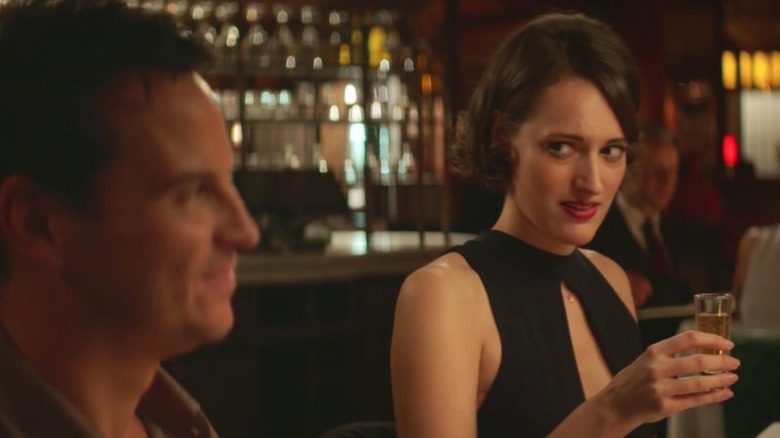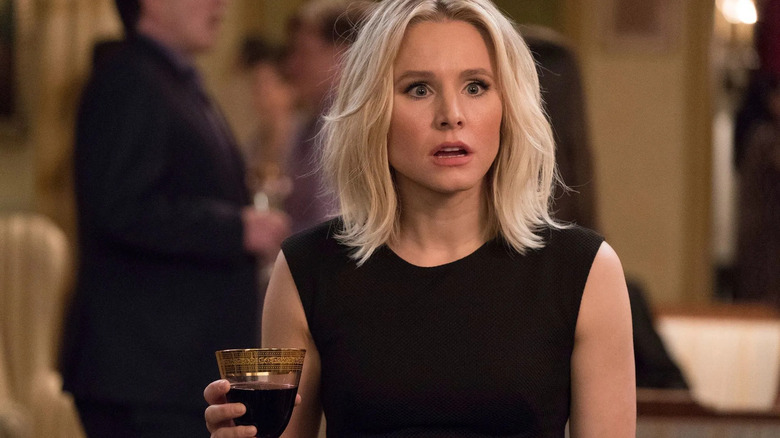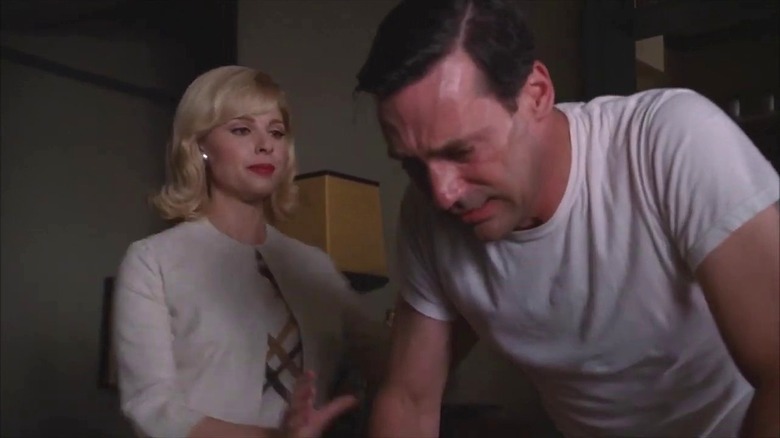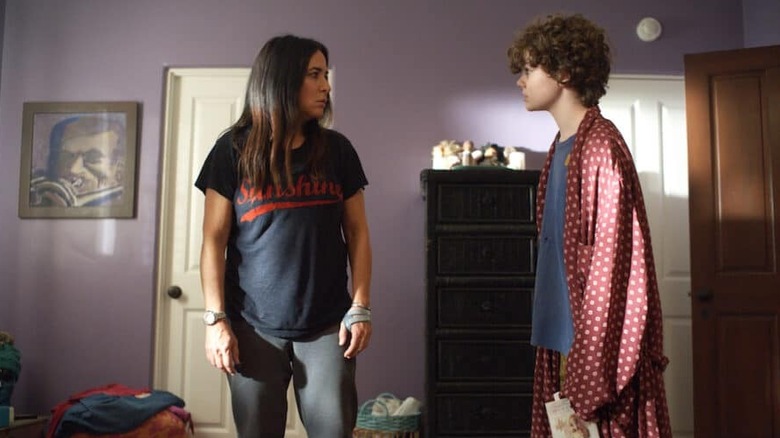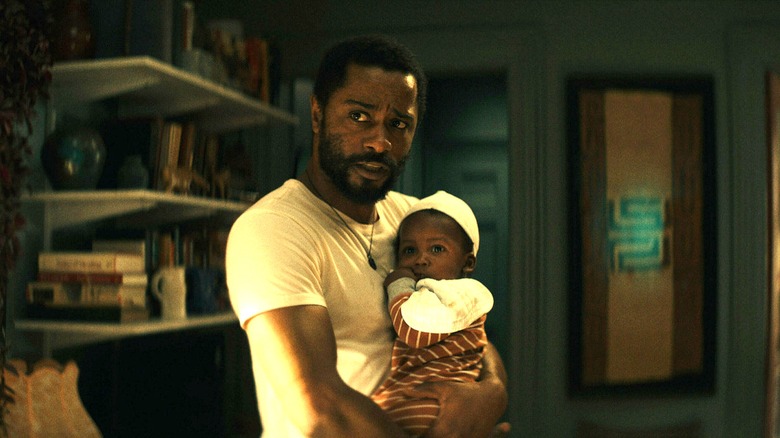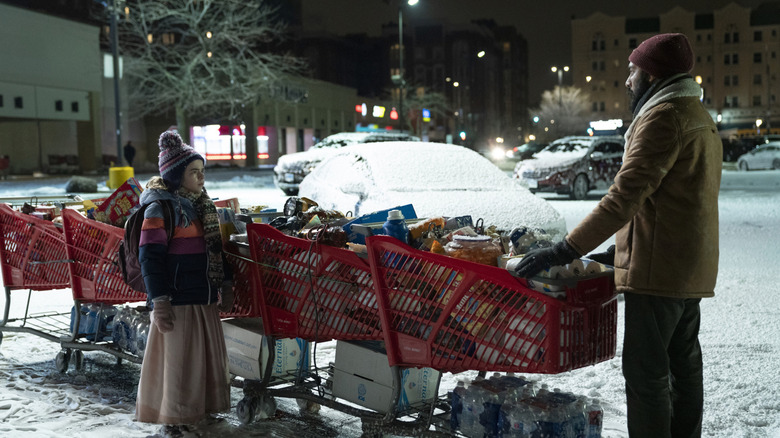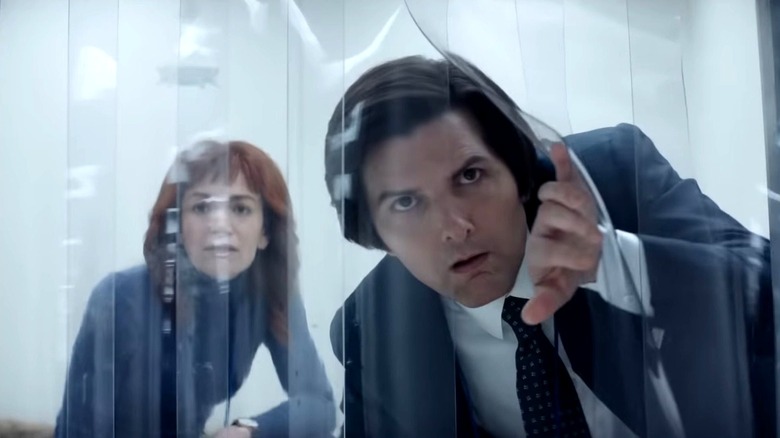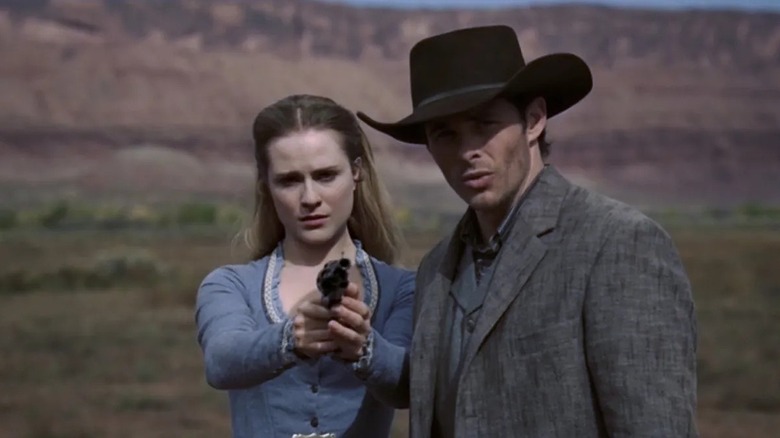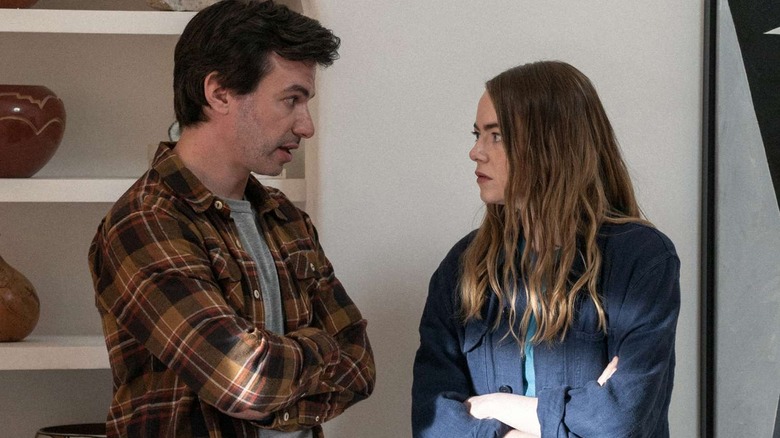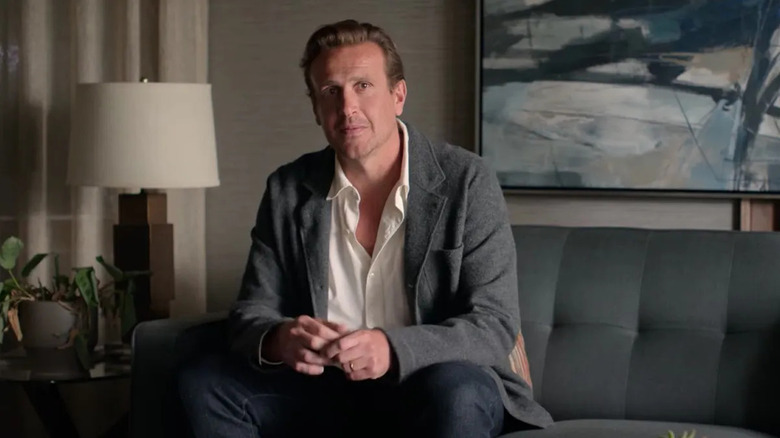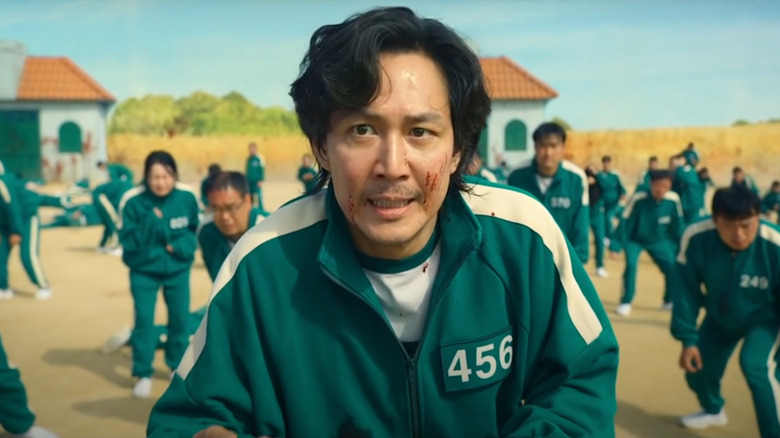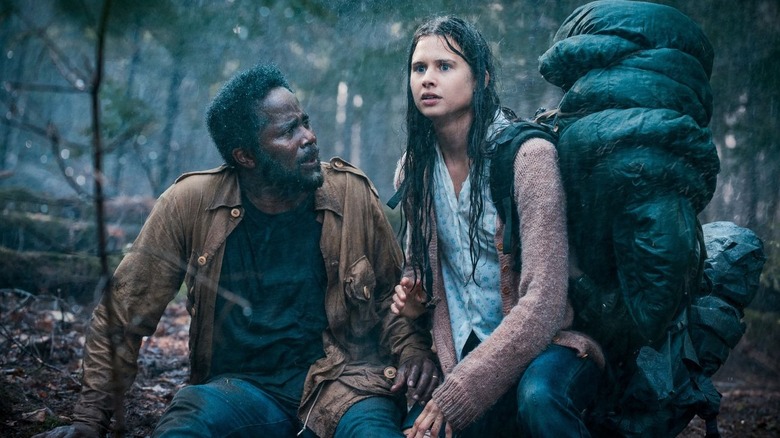TV Shows That Tap Into Everyday Fears
Whether it's an ancient fable meant to impart wisdom or a cautionary tale to keep people on the right path, stories throughout history have long tapped into the human psyche to affect their intended audience. No emotion, however, is as powerful as fear, and since the dawn of time, the things that frighten us most have also been the catalyst for some of mankind's greatest fictional tales.
Fast forward to the present day, and our fears have become a lot more abstract than worrying about an unseen predator lurking nearby. Whether it's worrying about committing a social faux pas, our own unchecked desires, or the traditional monster hiding in the dark, many of today's best TV shows draw from some of our greatest fears to craft their powerful, often insightful stories. So read on, as we've compiled a lineup of the best television shows that bring some of our most common fears to light on the small screen in scary, haunting — and sometimes humorous — tales of terror.
Fleabag - the fear of dying alone
Most everyone wants to live a life complete with a fulfilling job, a vibrant social calendar, a loving family, and a committed romantic partner. For many people, it's finding a romantic partner that seems to elude them the most. Whether it's because of failed relationships or just the struggle to connect with the right person, almost everyone has at least one moment in their life where they fear that they'll never find that person. No show captures that fear better than the British black comedy "Fleabag."
Written by and starring Phoebe Waller-Bridge, "Fleabag" follows the journey of an unnamed Londoner in her search for love, sex, and companionship. As the series opens, she is reeling from the suicide of her best friend, Boo, who took her own life after being cheated on. Beside herself with grief, "Fleabag" eventually realizes that deep down, she's terrified of being alone. Worse still, to find what she's really looking for, she's going to have to come to terms with her past — and her own character flaws.
A darkly comedic rom-com, "Fleabag" is some of the best drama to come out of British television in the past decade. But be warned — the story will probably have you taking a long look in the mirror and reflecting on all your past romantic mistakes. Even worse, we might have to wait till 2035 for a third season.
The Good Place - The fear of being silently judged
Probably the most common fear is the fear of death. We might experience it in childhood when we first realize that it's going to happen to us at some point, during a mid-life crisis, or later in life as we face our own mortality. Set in the afterlife, "The Good Place" — which has a surprising real-life inspiration — clearly taps into this common fear. But it's another worry, one that can overwhelm us with a sense of quiet dread, that the show truly focuses on: the fear of being silently judged.
"The Good Place" centers on Eleanor Shellstrop (Kristen Bell), a young woman who dies in an accident and finds herself in what she's told is Heaven. Over the course of the series, though — and these are some heavy spoilers here, so be warned — Eleanor discovers that she's actually in the OTHER place — the Bad Place. She also learns that every human on Earth has had their lives recorded and every action they've ever taken has been given a positive or negative value, adding up to a total that will determine whether you go to the Good Place or the Bad Place.
We may spend our entire lives wondering what lies beyond and even fearing what that might be — but the real dread comes when we think about how somewhere up there, someone may be judging us for even the most minor mistakes.
Mad Men - The fear of others finding out who you really are
"Mad Men" is the story of Don Draper (Jon Hamm), a whip-smart, savvy ad executive in the 1960s who, at least from the outside, seems like a normal working husband and father. But he's also a swinging '60s womanizer behind his family's back, romancing just about every beautiful woman who enters his field of vision. And yet, that's not his biggest secret — Don Draper isn't even his real name. Over the course of the show's run, we learn about his dark past and the effort he's gone to in order to hide his true self. Because Don Draper isn't just a new name; it's a new identity that he's created to be stronger, tougher, and more charismatic than the man he really is.
While most of us aren't hiding a secret second life, we have probably all suffered from some form of impostor syndrome and the fear that those around us will discover that we aren't who they think we are. It could be when we're with friends, when we're at work, or when we're trying to impress our romantic partners, but there are times when we put on too good a false face and wonder if we can hide our biggest flaws. The worry that those around us will discover the truth — real or imagined — is terrifying, as we fear losing our jobs, our friends, and even our loved ones should they discover who we are underneath our daily facade.
Better Things - The fear of being a bad parent
For those who aren't or have never been parents — especially parents of teenagers — it might be harder to understand this one. But the reality is, most parents go through a phase where they wonder if they're making the right decisions for their kids. Will their bad decisions backfire and ruin their children forever? Will they fracture the already-tenuous relationship they have with their rebellious teens? Well, Pamela Adlon's "Better Things" is basically a show about a single mother who — despite all her good-faith efforts — lives under the constant weight of parenting pressure.
Adlon plays Sam Fox, whose two daughters are Max (Mikey Madison) and Frankie (Hannah Alligood). No matter how hard she tries, Sam never seems to be able to get parenting right; she shows her daughters love and care, but sometimes overreacts to her kids' mischievous behavior — and they're always causing problems. Even when her kids are good, the stress of work and managing her home means Sam can't always be the good mother she aspires to be. In the end, the series gives us a mom who is trying her best and isn't always perfect, dealing with the fear that she could be better — just like most parents.
The Changeling - The fear that something will happen to our kids
Even if you've never been a parent, you'll still probably understand the greatest fear every new mother or father has: that someone — or something — will take their child away. Be it death, kidnapping, or something else entirely, the nightmare of having a child taken from you is probably the single worst fear anyone could ever experience — even more than fearing for one's own life — because there is nothing as vulnerable and defenseless as a baby. The Apple TV+ series "The Changeling" begins with just such a horror, as Apollo Kagwa (LaKieth Stanfield) grapples with the abduction of his newborn son.
In "The Changeling," it's Apollo's seemingly disturbed wife, Emma (Clark Backo), who is revealed to have taken their baby, though for what purpose, we don't immediately know. The story ultimately unravels a complicated web that all leads back to what appears to be some kind of cult, as well as an apparent supernatural evil. We may not fear those kinds of devilry, but the specter of kidnapping and other terrifying dangers haunts new parents, especially as human trafficking and child abductions have seen alarming increases in recent years, making the news and becoming the topic of dramatic true crime documentaries.
Station Eleven - the fear of a global pandemic
Admittedly, this one wasn't really an everyday fear until recently, when the events of the COVID-19 pandemic changed the way we, as a society, view communicable diseases. While most of us have more or less reverted back to pre-pandemic levels of caution, many people have forever changed the way they handle illness and hygiene. The fear of another global pandemic sits with most of us these days, even if it's just in small, subtle ways: HBO's "Station Eleven," a great show that unfortunately got review bombed for spurious reasons, put that fear front and center, even if it didn't do it on purpose.
Not on purpose, we say, because "Station Eleven" began production just before the outbreak of COVID-19 and eerily had to be paused when most of Hollywood shut down amid the pandemic. The show opens in 2020, right as a deadly airborne virus begins to rapidly spread, killing much of the population. At the heart of the story is a young girl named Kirsten (Matilda Lawler) who winds up in the care of a stranger named Jeevan (Himesh Patel) after she's unable to find her parents during the outbreak.
Decades later, with society all but gone, an adult Kirsten (Mackenzie Davis) lives with a post-apocalyptic theater group that entertains survivors with their traveling show. It's a not-so-impossible future world we all now legitimately fear, as we came too close to seeing it become a reality just a short while ago.
Severance - the fear that work will consume our life
Work-life balance is a big issue these days, especially in a post-pandemic world where more and more of us are working from home, either full or part-time. Yet the problem of being consumed by our work life is one society has faced for ages, as workers themselves had to literally fight — with violence — to get the right to a work-free weekend, demonstrating the importance of collective bargaining. Still, even with the rights we now have, there is a persistent fear, thanks to a combination of economic and social troubles, that we'll be forced to work longer and harder just to make ends meet. This fear of work consuming our entire lives sits at the center of Apple TV+'s critically acclaimed sci-fi drama, "Severance."
At the mysterious biotech company called Lumon Industries, we meet Mark (Adam Scott), who works in the Macrodata Refinement Division. But in this bizarre future world, employees undergo a procedure called Severance, where a person's entire memory structure is manipulated so that they have no memory of work after they clock out. It also means they have no memory of their personal lives when they're clocked in, effectively creating two distinct identities within a single person. It's the "work version" of Lumon employees that we all fear — a life dedicated solely to our job, with no life outside of it.
Westworld - the fear of AI run amok
The fear of technology going haywire isn't anything new, nor is the fear that it will take over our lives and take away our humanity. As a society, we've been grappling with these concerns going at least as far back as the original printing press, which some more fearful folk worried would put hand-scribes out of work and destroy the value of the written word. But never have these fears been more well-founded than today, when artificial intelligence seems out of control, putting people out of work and taking the soul out of the creative arts. HBO's "Westworld" explored the dark side of AI run amok in a series adaptation of the 1973 film of the same name that posited the very same thing and wound up becoming one of the best modern TV Westerns of all time in the process.
In "Westworld," technology is so advanced that lifelike robots called hosts are so convincingly human that they are used to populate a massive, immersive theme park set in the American Wild West. There, guests can indulge their deepest and sometimes darkest fantasies, raping and killing to their hearts' content without any fear of reprisal. This leads to a grim exploration of human nature while also grappling with the notion that artificial intelligence could be sentient and, thus, deserving of its own rights. While the reality of "Westworld" may have seemed far-fetched when it launched in 2016, we're now in a world where it seems almost inevitable.
The Curse - the fear that we might not be as nice as we think we are
Comedian, actor, and writer Nathan Fielder has a reputation for blurring the line between reality and fiction, and his 2023 series, "The Curse," might be his strangest project yet. A drama centered on a young married couple who host their own reality show, "The Curse" follows Asher and Whitney Siegel (played by Fielder and co-star Emma Stone), whose TV project revolves around their efforts to lift up an immigrant community by providing them with affordable homes fueled by clean energy. The question becomes, however, whether they actually want to help people or if they're just trying to get rich off the backs of the less fortunate.
Nearly abstract at times (particularly that bizarre ending), "The Curse" digs into the nature of goodness and ego. As the story unfolds, we get to understand the Siegels' true character — or rather, as true as they're willing to reveal — and come to ask whether they're even nice people at all. At times, the series can get downright uncomfortable to watch, mostly because of how relatable it is, even if most of us have never gone to the same extremes as the Siegels. Because, while we all want to believe we are good people, there's always a nagging fear that maybe we're not as nice as we think we are.
Shrinking - the fear of losing a loved one
Another Apple TV+ original, "Shrinking" stars Jason Segel and Harrison Ford as a pair of therapist co-workers. Segel is Jimmy Laird, whose wife died shortly before the series begins. He's still not recovered from the loss but is back on the job in an effort to return to normalcy while also facing bitterness from his teenage daughter, Alice (Lukita Maxwell). Now, his older, world-weary colleague, Dr. Rhoades (Ford), is forced to counsel the counselor through his grief. It's a powerful story and a hilarious comedy that explores the reality of many people's worst fear: losing a loved one.
"Shrinking" doesn't so much explore death itself, though, as much as it does the fallout and how it affects those who are left behind. And it's that fallout that's really what people fear — how does one move on when they've lost someone important to them? Most of us can't bear to think about such an eventuality, and when we do, we're left to imagine the emotions we'd go through and whether we'd be able to go back to work and return to a semi-normal life. "Shrinking" shows us all of that and more, as Laird can barely manage to get out of bed some days, while going overboard with work on others.
Squid Game - the fear of losing everything
Hailing from Korea, the Netflix original drama "Squid Game" presents a reality competition unlike any other. Selected seemingly at random, the participants battle for their very lives in a series of games that test their skills and require them to make impossible moral choices. In the end, only the winner will survive, but the prize is a life-changing sum of cash. The drama plays out in a series of tense competitions interspersed with flashbacks that reveal more about the participants — such as the fact that all of them were facing destitution — and their desperation for money has led them to do the most horrific things imaginable.
Featuring numerous characters who are driven by the their experiences of living in poverty, "Squid Game" taps into the very real worry that most of us feel: that at any moment we could lose everything — our job, our family, our friends — and be forced into impossible circumstances. When this fear arises, we often ask ourselves what we would do in the face of such a dire predicament. Could we accept a lowly job that we feel is beneath us? Or, worse, are we willing to do shameful or even terrible things just to be able to support ourselves and our families?
Sadly, though the games in "Squid Game" are fictional, the real world offers up more than enough sickening options for those desperate to make a buck. Can we really say with confidence that we wouldn't be willing to go to dark places if our situation left us with no other choice?
From - fear of what lurks in the dark
When it comes to fears, few are as universal as a fear of the dark, which likely originated from our distant origins when humans were nomadic hunter-gatherers. Back then, this anxiety was an evolutionary advantage developed by our ancestors, who had to stay on their toes at night lest they risk being hunted by larger predators. Today, that fear continues to manifest even though we're safer than we've ever been in history, because our brains have been trained for millions of years to find patterns and faces in the darkness that could be a threat. Plenty of shows tap into this fear, but the Epix original series "From" does so more than most.
Set in a strange locale that exists in a borderland between good and evil, "From" follows the residents of the supernatural burg known only as the Township. Here, nobody who enters can ever leave, and countless otherworldly dangers lurk in the dark, always ready to strike. Among the residents is Boyd Stevens (Harold Perrineau), who serves as the head of the community as well as its sheriff. Stevens constantly works to protect the Township's people while also searching for a way to escape. Like a nightmare come to life, "From" will probably make you forget everyone who ever told you that those creepy shadows and creaking sounds were just the trees swaying in the wind.
